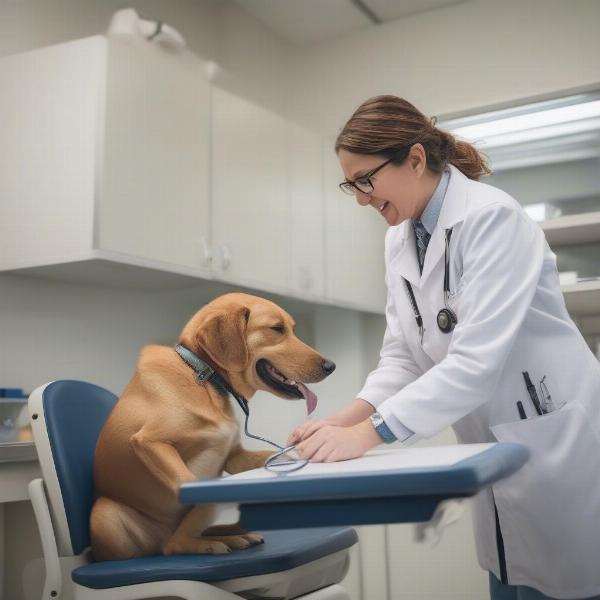Panting is a normal behavior for dogs, a way for them to regulate their body temperature. However, excessive panting at night, especially if accompanied by restlessness or other unusual symptoms, can be a cause for concern. So, why does my dog pant at night? Let’s explore the various reasons, ranging from simple explanations to more serious underlying medical conditions.
Common Causes of Nighttime Panting
Several relatively harmless factors can contribute to a dog panting at night. These include:
- Temperature: Is your home too warm? Dogs don’t sweat like humans, so they rely on panting to cool down. A stuffy room or thick bedding can make your dog overheat, especially during warmer months. Ensure good ventilation and consider a thinner blanket or cooling mat for your furry friend.
- Anxiety or Stress: Just like us, dogs can experience anxiety and stress. Nighttime noises, being alone, or changes in routine can trigger panting. A comforting toy, calming music, or even a pheromone diffuser can help alleviate their anxiety.
- Recent Exercise: Did your dog have a vigorous play session close to bedtime? It takes time for their body temperature to return to normal after exercise, leading to panting. Try to schedule strenuous activities earlier in the day.
- Excitement or Anticipation: Sometimes, the simple anticipation of a walk, treat, or even your presence can make a dog pant. This is usually short-lived and nothing to worry about.
When to Worry: Potential Medical Concerns
While often benign, nighttime panting can sometimes indicate an underlying health issue. If your dog’s panting is persistent, excessive, or accompanied by other symptoms, consult a veterinarian. Some potential medical reasons for panting at night include:
- Pain: Panting can be a sign of pain or discomfort. Arthritis, injuries, or other medical conditions can make your dog pant, especially at night when they are trying to rest.
- Heart Problems: Heart disease can make it difficult for a dog’s heart to pump blood efficiently, leading to panting and other symptoms like coughing, lethargy, and difficulty breathing.
- Respiratory Issues: Conditions like pneumonia, asthma, or bronchitis can restrict airflow and cause panting.
- Cushing’s Disease: This hormonal disorder can cause increased thirst and urination, along with panting.
- Obesity: Overweight dogs are more prone to overheating and panting, even at night. Maintaining a healthy weight is crucial for your dog’s overall well-being.
- Bloat: This is a life-threatening condition that requires immediate veterinary attention. Symptoms include panting, restlessness, a distended abdomen, and attempts to vomit.
 Dog Panting With Vet
Dog Panting With Vet
Old Dog Panting?
old dog panting is quite common, especially at night. Age-related changes like decreased heart function, arthritis, or cognitive decline can contribute to panting.
What if my dog has diarrhea at night?
If your dog is experiencing both dog has diarrhea at night and panting, it could be a sign of a more serious issue. It’s important to contact your vet immediately.
Dog panting while resting?
dog panting while resting, particularly at night, can be concerning. While it might simply be due to heat or anxiety, it could also indicate an underlying health problem.
Dog panting at night and restless?
If your dog panting at night and restless, it’s crucial to seek veterinary advice. This combination of symptoms could indicate pain, discomfort, or a serious medical condition.
Conclusion
While occasional panting at night is often normal, persistent or excessive panting warrants further investigation. By observing your dog closely and consulting a veterinarian when needed, you can ensure their comfort and address any potential health issues. Addressing the underlying cause will help your dog sleep soundly and peacefully through the night.
FAQ
- Q: Is it normal for my dog to pant a little at night? A: Some panting can be normal, especially if it’s warm.
- Q: When should I be concerned about my dog panting at night? A: If it’s excessive, persistent, or accompanied by other symptoms, consult your vet.
- Q: Can anxiety cause a dog to pant at night? A: Yes, anxiety or stress can trigger nighttime panting.
- Q: How can I help my dog stop panting at night? A: Ensure a comfortable temperature, provide a calming environment, and consult your vet if needed.
- Q: What are some serious medical reasons for a dog panting at night? A: Heart problems, respiratory issues, pain, and Cushing’s disease are some potential causes.
- Q: What should I do if my dog is panting heavily and restless at night? A: Contact your veterinarian immediately.
- Q: Could my why does my dog pant so much at night? A: Several factors, including heat, anxiety, pain, or underlying medical conditions, could be contributing.
ILM Dog is your trusted resource for expert dog care advice. We offer guidance on everything from breed selection and puppy care to senior dog health and training. Our team of experts is dedicated to providing valuable, practical information to dog owners worldwide. Whether you’re a new dog owner or a seasoned pro, ILM Dog is here to help you navigate every aspect of dog ownership. Contact us at [email protected] or +44 20-3965-8624 for personalized support.